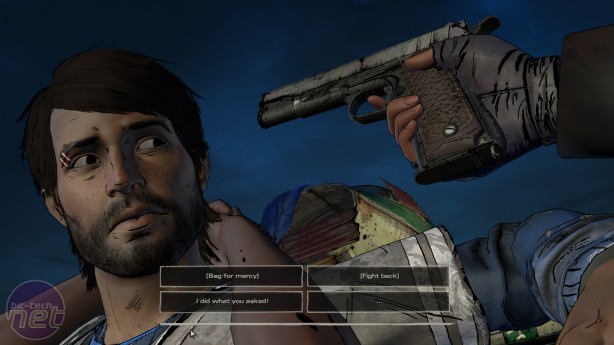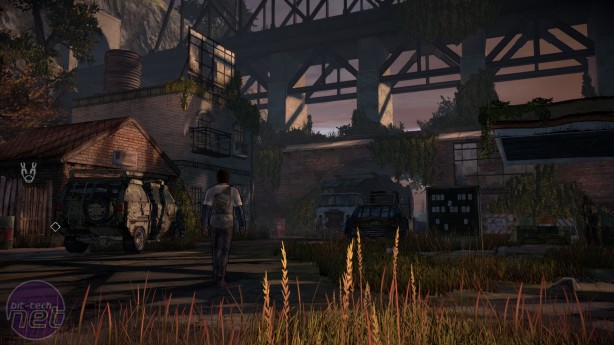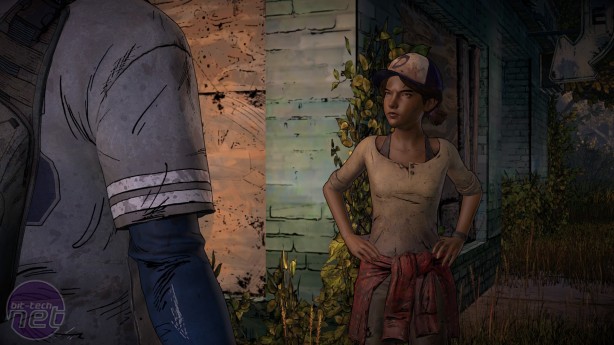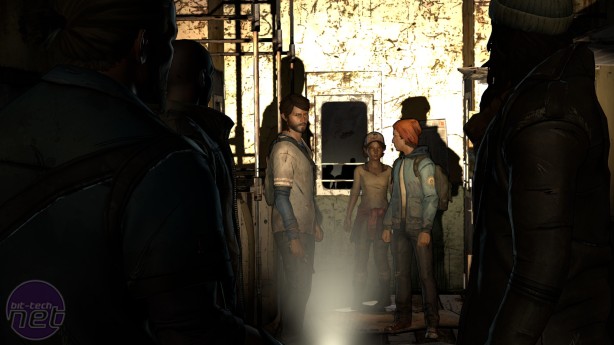The Walking Dead: A New Frontier: Episodes 1 & 2 Review
January 16, 2017 | 12:59
Companies: #telltale-games

At this point The Walking Dead reverts to type. What initially seemed a promising new direction from the series reveals itself to be the same grisly carnival ride of shocking deaths, gut-wrenching choices, and howling misery. The problem is that the deaths aren’t as shocking as they once were and making a decision is more being resigned to the fact that the game will ultimately screw you over whichever path you choose.
Like Clementine and the other survivors, we as an audience have become hardened to the Walking Dead’s world, and so it needs to find new ways to tell its story, to soften us up before it tries to shock us again. A New Frontier initially looks as if it might go down that route, but then it goes back to killing off characters you’ve barely had a chance to become acquainted with and offering you choices that ultimately don’t matter.
Some of these are particularly egregious. In the first episode, Clementine and Javier confront an arms merchant who sold dodgy bullets to Clem. [Minor spoilers ahead] Eventually, the argument becomes heated, and Javier can either shoot or spare the dealer. But if he chooses to spare him, Clem’s gun goes off by accident, even though the reason they’re having the argument in the first place is the bullets in Clem’s gun don’t fire.
Speaking of Clem, I wonder whether the writers haven’t gone too far in mining out her character for the sake of shock value. She seems less of a grizzled survivor and more a hollowed-out shell of a person. She speaks in this flat monotone that makes her sound almost bored. Obviously, she’s been through horrific trauma and struggles to become attached to people as a consequence. But like so much else in A New Frontier, Telltale’s approach lacks subtlety.
I understand that Telltale has a certain story it wants to tell. But dialogue and narrative choices are the only meaningful way the player interacts with these games, and yet the series seems increasingly determined to undermine those decisions at every turn (unless you happen to go along with Telltale’s planned plot). Compare this to games like The Witcher 3, which not only has decisions that visually affect the world around you, but does a whole lot more besides, and you start to wonder what exactly Telltale is offering the player here.
Even the other aspects of the game seem less substantial than they were before.
Areas where you can freely walk around are extremely limited. Sometimes you can only take a few steps before the game wrenches control from your hands like an impatient sibling. Puzzles are virtually non-existent, reduced to finding one or two items in an area you need before moving on. The QTE combat sequences are the same as ever, although the zombies might as well not be in the game, so little threat do they seemingly pose to the survivors now. The only area where the game has noticeably improved is in the engine, and even that is only slight. In fact, both episodes feel distinctly shorter than previously, seeming to rush through the action in each chapter, giving you little time to find your feet.
The good news is we’re only two episodes in, so there’s still time for A New Frontier to make its mark. Plus, the reveal at the end of episode two gave me hope that the series might have more to say than simply EVERYTHING IS HORRIBLE. Right now, though, this is not a strong start for the series, and those hoping for something more ambitious from Telltale will find themselves disappointed.
Like Clementine and the other survivors, we as an audience have become hardened to the Walking Dead’s world, and so it needs to find new ways to tell its story, to soften us up before it tries to shock us again. A New Frontier initially looks as if it might go down that route, but then it goes back to killing off characters you’ve barely had a chance to become acquainted with and offering you choices that ultimately don’t matter.
Some of these are particularly egregious. In the first episode, Clementine and Javier confront an arms merchant who sold dodgy bullets to Clem. [Minor spoilers ahead] Eventually, the argument becomes heated, and Javier can either shoot or spare the dealer. But if he chooses to spare him, Clem’s gun goes off by accident, even though the reason they’re having the argument in the first place is the bullets in Clem’s gun don’t fire.
Speaking of Clem, I wonder whether the writers haven’t gone too far in mining out her character for the sake of shock value. She seems less of a grizzled survivor and more a hollowed-out shell of a person. She speaks in this flat monotone that makes her sound almost bored. Obviously, she’s been through horrific trauma and struggles to become attached to people as a consequence. But like so much else in A New Frontier, Telltale’s approach lacks subtlety.
I understand that Telltale has a certain story it wants to tell. But dialogue and narrative choices are the only meaningful way the player interacts with these games, and yet the series seems increasingly determined to undermine those decisions at every turn (unless you happen to go along with Telltale’s planned plot). Compare this to games like The Witcher 3, which not only has decisions that visually affect the world around you, but does a whole lot more besides, and you start to wonder what exactly Telltale is offering the player here.
Even the other aspects of the game seem less substantial than they were before.
Areas where you can freely walk around are extremely limited. Sometimes you can only take a few steps before the game wrenches control from your hands like an impatient sibling. Puzzles are virtually non-existent, reduced to finding one or two items in an area you need before moving on. The QTE combat sequences are the same as ever, although the zombies might as well not be in the game, so little threat do they seemingly pose to the survivors now. The only area where the game has noticeably improved is in the engine, and even that is only slight. In fact, both episodes feel distinctly shorter than previously, seeming to rush through the action in each chapter, giving you little time to find your feet.
The good news is we’re only two episodes in, so there’s still time for A New Frontier to make its mark. Plus, the reveal at the end of episode two gave me hope that the series might have more to say than simply EVERYTHING IS HORRIBLE. Right now, though, this is not a strong start for the series, and those hoping for something more ambitious from Telltale will find themselves disappointed.

MSI MPG Velox 100R Chassis Review
October 14 2021 | 15:04













Want to comment? Please log in.